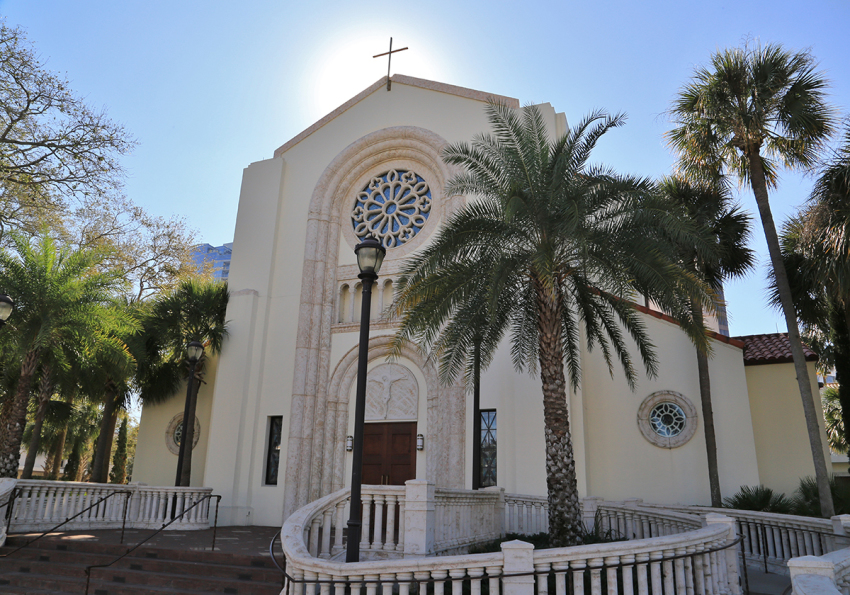US Catholic bishops warn 'lives of people of faith' at risk in 2024

The U.S. Conference of Catholic Bishops’ Committee on Religious Liberty warns that attacks on churches constitute the “largest threat to religious liberty in 2024” and could threaten “the very lives of people of faith.”
The USCCB’s Committee on Religious Liberty released its annual report, titled “The State of Religious Liberty in the United States” on Tuesday. The document acts as a year in review highlighting developments on issues related to religious liberty such as abortion, human sexuality and immigration across all three branches of government as well as “national trends in politics, culture, and law.”
The report concluded with a list outlining “the five largest threats to religious liberty in 2024 and five ways to respond.” The Committee, which “works to strengthen and sustain religious freedom by assisting the U.S. bishops, individually and collectively, to teach about religious freedom to the faithful and the broader public, and to promote and defend religious freedom in law and policy,” identified “attacks on houses of worship” as the “largest threat to religious liberty in 2024.”
“Were this threat limited to a continuation of the property crimes, that have been perpetrated on Catholic churches over recent years, perhaps it would not be the committee’s chief concern,” the report stated. “However, boiling tensions over the Israel-Hamas conflict have elevated the chances of a terrorist attack on a synagogue or mosque.”
As the report suggested, Catholic churches have found themselves subject to violence and vandalism following Politico’s publication of the leaked draft decision in the U.S. Supreme Court case of Dobbs v. Jackson Women’s Health Organization, which determined that the U.S. Constitution does not contain a right to abortion. Catholic churches likely became targets of pro-abortion activists outraged by the draft Supreme Court decision due to the Catholic Church's outspoken opposition to abortion.
Churches vandalized in the immediate aftermath of the May 2022 publication of the leaked draft include: Holy Rosary Church in Houston, Texas; St. Bartholomew the Apostle Catholic Church in Katy, Texas; St. Joseph’s Priory in Armada, Michigan; St. John XXIII Catholic Parish in Fort Collins, Colorado, and the Sacred Heart of Mary Church in Boulder, Colorado.
While most instances of vandalism involved the spray-painting of graffiti on church facilities, the tabernacle was stolen in one case.
The attacks on Catholic churches continued in the months following the publication of the official Dobbsdecision in June 2022. Targeted churches included Holy Family Catholic Church in Hillsborough, North Carolina, and St. John Neumann Church in Reston, Virginia.
The violence and vandalism directed at houses of worship extends beyond Catholic churches and dates back to before the Dobbs decision. The Family Research Council, a Washington, D.C.-based advocacy group, published a report last year that found more than 400 churches were attacked between 2018 and 2022. Additional research from the socially conservative think-tank found that 69 churches were attacked in the first three months of 2023.
The Committee warned that “the highly charged atmosphere around the 2024 election might lead far-left extremists to escalate the severity of attacks on Catholic churches, and far-right extremists may view Catholic churches and Catholic Charities facilities as targets for anti-immigrant sentiment or, worse, violent action.”
The issue of abortion, seen as a motivating factor behind the targeting of Catholic churches, is expected to loom large in the 2024 election.
Voters in several states could find themselves voting on ballot measures seeking to enshrine a right to abortion in state constitutions, including: Arizona, Florida, Idaho, Missouri, Nebraska, North Dakota, Oklahoma and South Dakota. Pro-abortion groups have sought to pass such referendums following the Dobbs decision and have seen the ballot questions pass in California, Michigan, Vermont and Ohio.
The states that could vote on similar measures as early as this year all enacted strong pro-life protections in the wake of the Dobbs decision.
Noting that “the Committee was founded in response to increasing legal threats that the U.S. bishops discerned at the time,” the report cited the obligation to “decry foreseeable threats to the very lives of people of faith” as unusual: “There is no greater threat to religious liberty than for one’s house of worship to become a place of danger, and the country sadly finds itself in a place where that danger is real.”
The Committee listed the possibility of doctors at Catholic hospitals being forced to perform elective trans procedures on children due to the federal government’s interpretation of the Affordable Care Act as the second biggest threat to religious liberty in 2024.
Concerns about federal law possibly restricting the ability of Catholic nonprofits to minister to illegal immigrants, the potential use of federal law to force people to “conform to the orthodoxy of gender ideology,” and the prospect of the Pregnant Workers Fairness Act forcing employers to give their employees paid leave to obtain an abortion rounded out the Religious Liberty Committee’s list of the “five largest threats to religious liberty in 2024.”
Ryan Foley is a reporter for The Christian Post. He can be reached at: ryan.foley@christianpost.com



























